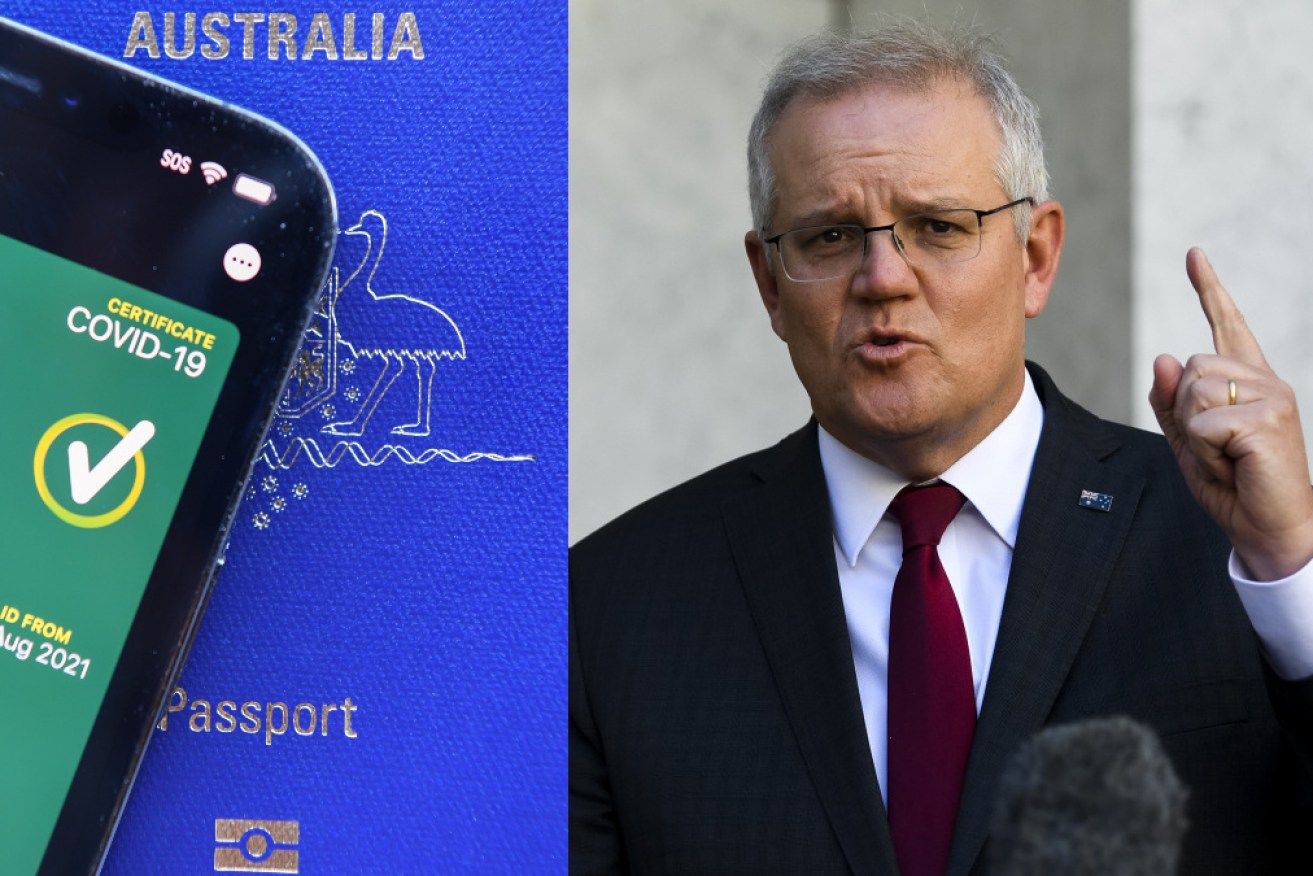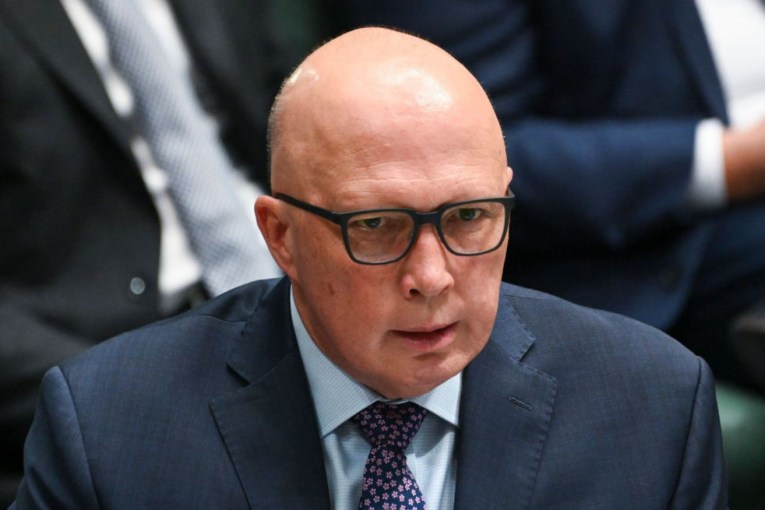PM backs businesses rejecting unvaccinated customers as vaccine passport plans firm


Scott Morrison has shifted his rhetoric on businesses rejecting unvaccinated customers. Photo: AAP/Getty
Scott Morrison has backed businesses to reject customers or guests who haven’t been vaccinated against COVID-19, giving the clearest picture on how so-called ‘vaccine passports’ could be used in Australia.
The Prime Minister has gradually been preparing the ground for such a scheme, but his latest position risks a backbench revolt and raising the ire of a growing movement of many thousands of people opposing vaccine passports.
“A business under property law has the ability to say ‘No, you can’t come in’, and they can ask for that,” Mr Morrison told 2GB radio on Wednesday, when asked if people may need to show vaccination proof during their daily business.
“That’s a legitimate thing for them to do, and they’re doing that to protect their own workers, to protect their other clients.”
Vaccine certificate plan firms
The government has been carefully setting the scene for such a scenario, speaking about expectations that citizens would likely need to show proof of vaccination for air travel and entering public spaces.
Qantas has mandated vaccination for passengers, but what’s less clear is whether basic public areas, such as supermarkets or offices, may have similar restrictions.

Fully vaccinated Australians can access digital proof via Medicare. Photo: Getty
On Wednesday, after days of pressuring state governments to stick to an agreement about relaxing COVID rules when 70 per cent of the adult population is vaccinated, Mr Morrison explicitly said that businesses would be able to bar entry to those who choose not to be vaccinated.
“If you’re not vaccinated, you represent a greater public health risk to yourself, to your family, to your community and others about you, so it’s only sensible that people will do sensible things to protect their public health,” the PM said.
It is a shift from his rhetoric on this same subject just three weeks ago.
When asked on 5AA radio on August 2 whether businesses should be able to ask customers for vaccine status, Mr Morrison responded “the law doesn’t allow for that”.
“Unless there’s a public health order that goes to those matters, that’s my advice. That currently doesn’t enable those sorts of things to occur, just like it wouldn’t enable people to be prevented from attending a venue or something like that,” he said at the time.
“But state governments can put those in place, Phase B of the plan is all about ensuring that those who have been vaccinated do get exempted from restrictions.”
Mr Morrison said several states were working on such plans for when vaccination rates hit 70 per cent and Australia begins Phase B of national cabinet’s reopening plan.
Freedoms tied to vaccine proof

Scott Morrison says vaccination proof can be requested by businesses. Photo: AAP
The federal government has painted vaccine certificates as allowing for incentives and rewards for getting immunised, portraying such measures as positives for those who are vaccinated rather than negatives for those who aren’t.
The government has outlined rough details about how vaccine proof would be displayed through QR codes on phones, or in paper hard-copy form.
Negotiations continue between federal and state government on exactly how a smartphone-based vaccine certificate would work, and where it would be used.
The current plan for domestic settings would integrate data from the federal Australian Immunisation Register (AIR) into existing QR code check-in apps managed by each state, so people can sign in at a venue while simultaneously proving they’ve been vaccinated.
That would allow states to retain check-in data for contact tracing purposes.
The New Daily understands final details of the plan will be announced within weeks, as Australia gets closer to the Doherty Institute modelling vaccination targets of 70 per cent.
The federal government refers to such proof for domestic settings as vaccine certificates, making the point there will also need to be separate vaccine passports for international travel.
Those passports, TND understands, will likely run off a different app and be the subject of even trickier global negotiations, as different governments set their own rules on which vaccines they will accept for travel.

Stuart Robert said states and territories would set their own vaccine status rules. Photo: AAP
For instance, several nations do not accept China’s Sinovac or Sinopharm vaccine for travel, while the United States has not yet approved AstraZeneca.
Minister for Employment Stuart Robert, chairs a meeting of digital and data ministers from around the nation.
He said over the weekend that once the federal government integrated vaccine data with the states’ apps, it would be up to individual governments to set their own rules on where and when the vaccine status could be used.
“Whether that vaccination certification data is used will depend, of course, upon state and territory public health orders, and that’s a matter for those states and territories,” Mr Robert said.
“The intent of working with them is to allow an ease for Australians, so when they use that state-based app, not only can they use the state-based QR code in terms of the state processes, but can also demonstrate at the same time that they’ve been vaccinated.”
Kelly, Christensen oppose vaccine passport plan
The federal government’s behavioural economics teams expect Australia will reach nearly 80 per cent vaccination rates without much fuss, but that incentives will be needed to get above that number.
However, the small number of holdouts are likely to be noisy and unhappy about the vaccine passport plan.
Federal MPs like Coalition backbencher George Christensen and former Liberal Craig Kelly – now leader of the United Australia Party – have vehemently opposed any such framework.
Human rights groups like Amnesty International have also raised concerns.
Overseas, cities like New York and Paris have mandated vaccinations for entry to cafes, bars and concerts.
Mr Christensen is running a specific campaign on his website and social media pages, saying he would strongly oppose any scenario that “denies [unvaccinated people] jobs, denies them services, or denies them access to certain areas”.
There is also a small but dedicated rump of ordinary citizens who are using the federal Parliament’s website to launch multiple petitions opposing vaccine passports.
Of the top 11 campaigns on the Parliament’s e-petition website, four of them call for vaccine passports to be ruled out.
The most popular one has more than 79,000 signatures.
In a response to one of the petitions delivered in March, Health Minister Greg Hunt replied that “it is possible, in the future, vaccination against COVID-19 might become a requirement for travel to certain destinations or for people working in certain high-risk workplaces”.
Perhaps forecasting trouble from conservative voices, Mr Morrison told 2GB that his hopes about reopening had “nothing to do with ideology, and these issues around liberty and so on”.
“We all believe in freedom, but we also believe in people being healthy,” he said.








